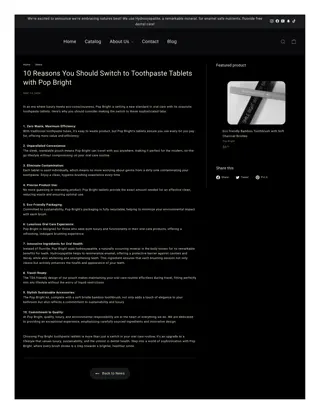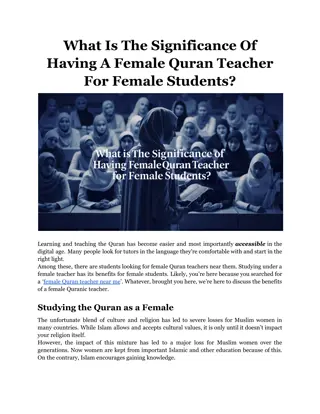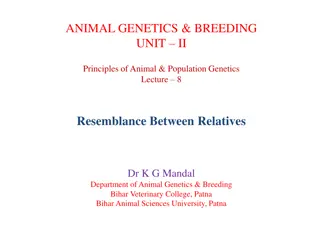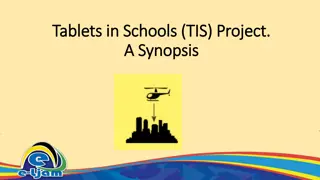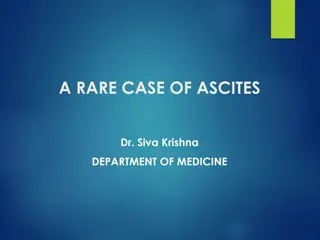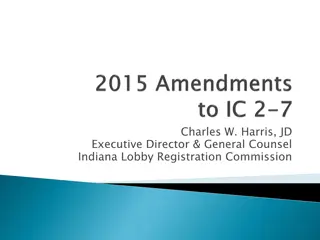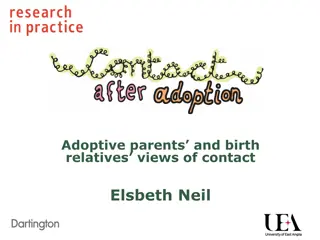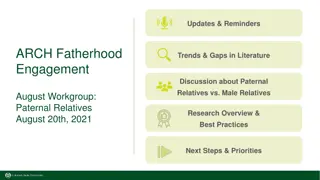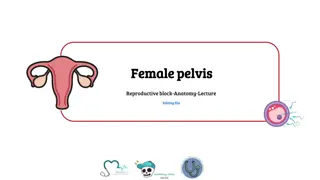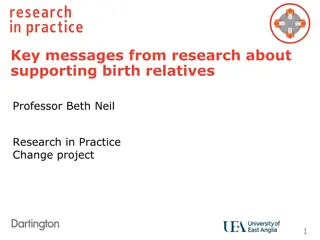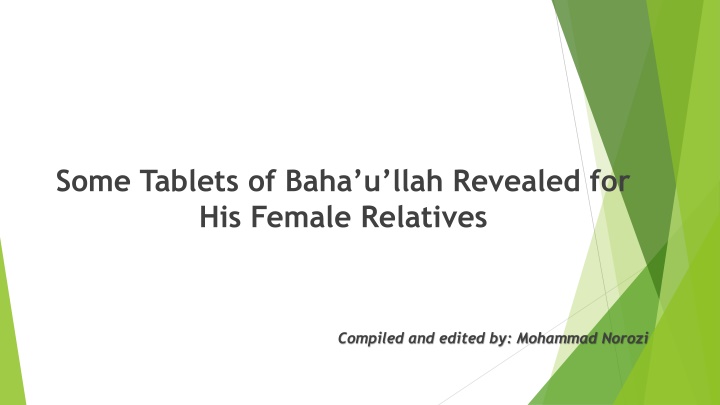
Tablets of Bahaullah Revealed for His Female Relatives
Explore some beautiful tablets of Bahaullah revealed for His mother and sisters, including a visitation prayer for Khadijih Khanum. Dive into the poignant writings expressing love, honor, and deep sentiments towards female relatives in the 19th century Middle East.
Download Presentation

Please find below an Image/Link to download the presentation.
The content on the website is provided AS IS for your information and personal use only. It may not be sold, licensed, or shared on other websites without obtaining consent from the author. If you encounter any issues during the download, it is possible that the publisher has removed the file from their server.
You are allowed to download the files provided on this website for personal or commercial use, subject to the condition that they are used lawfully. All files are the property of their respective owners.
The content on the website is provided AS IS for your information and personal use only. It may not be sold, licensed, or shared on other websites without obtaining consent from the author.
E N D
Presentation Transcript
Some Tablets of Bahaullah Revealed for His Female Relatives Compiled and edited by: Mohammad Norozi
Women of the Middle East in the 19th century are generally absent from the pages of history. Here are some beautiful tablets of Baha u llah that He revealed for His mother and sisters. Baha u llah, with His Mighty Pen, writes to them and at the same time talks about His sufferings in the path of God.
When Khadijih Khanum passed away, Baha'u'llah revealed a visitation prayer in her honour. It is signed Abdullah Husayn-Ali . The style of writing, the composition and mode of expression is the same as His other writings. Most certainly, had His mother passed away while He was in Iran, He would have eulogized her in person. The reason He signed it Abdullah Husyan-Ali is probably because it was being sent out to Iran and was going to be read by His relatives antagonistic to His claim. The prayer bears no date and there is no indication as to where it was revealed. Here is a provisional translation:
The most honoured, esteemed and respected mother. He is God! Praised be Thou O Lord, My God! This is My mother who hath acknowledged Thy oneness, confessed Thy unity, attained the honour of meeting Thy Manifestation in Thy days, reached the station of recognition and entered the tabernacle of Heaven, for she loved Thyself and Thy Servants and held fast to the cord of Thy love through the sanctified Temples of Thy Sovereignty. I beseech Thee, therefore, O My God, to grant her the honour of beholding Thy Beauty, and vouchsafe unto her the gift of Thy Presence. Give her to drink then from the ocean of Thy mercy and the chalice of Thy forgiveness. Make her to dwell, O My God, in the precincts of Thy mercy in the Heaven of eternity. Grant her to hear Thy holy melodies that she may cast the veil from her head in her eagerness to meet Thee and speed through the domains of Thy nearness and union. Thou art verily powerful over all that Thou desirest, and Thou art verily the Mighty, the Most Luminous. The Servant of God Husayn Ali. (Leaves of the twin divine trees, page 81 and 82).
Once, when Baha'u'llah had not heard from His sister (Sarih Khanum) for a long time, He wrote and enquired about her affairs. The reference in this Tablet to seclusion and solitude, which she may have chosen for herself, is significant. She may not have written to Baha'u'llah because credible information about Him was kept from her or she may have chosen silence as a means to avoid persecution. Here is a provisional translation:
He is God, the Most High! It has been a long time since news of thee hath been received. It seemth that thou hast secluded thyself from the world and its people, choosing solitude. I swear by the Peerless and Eternal Beloved that this Servant hath ever sought and will continue to seek that state for Himself, for in seclusion one s soul findeth peace whilst through association with others the spirit is consumed. The former is the attribute of the near ones who believe in God s oneness, the latter is the characteristic of heedless. However, there are times when solitude is rejected and association is desired. Thus hath it been ordained by the One Who is Mighty and Powerful. Nonetheless, I have all My life sought but not attained it. Upon My arrival in Iraq, detached from all else save God, I withdrew for two years, singly and alone I departed for wilderness and severed Myself from the world and its peoples. But during that period of withdrawal solitude was not granted to me. Those joyous days soon passed and came to an end, and it hath not been My portion ever since. Thus hath it been recorded by the Pen of Decree by the Finger of Splendour and Sanctity.
Cont Should thou desire to know My situation, 20 years have passed since I have seen the light of day. I swear by the Sun of the Celestial Beauty that during this time I have not partaken even a glass of water in comfort and have been denied even moment s rest owing to the venom of the ungodly. Like onto one constantly tormented in the mouth of a dragon, I have ever been confined in the prison of envy and afflicted by the claws of enemy. The tale of this Youth increaseth sorrow, His remembrance a book not suffice and its end the pen of creation is unable to describe. O My sister! By God, I have so bottled out from memory the remembrance of everything that I know not hath been written down. Sorrow hath so surrounded Me that I have forgotten Mine own Self, how much more the writing of letters. O that My Mother had never given birth to Me! May thou be always under the protection of God and abide in the shade of His mercy. Convey My sincere wishes to honourable mother. (Leaves of the twin divine trees, page 265-266).
In another tablet, to the same sister, Baha'u'llah describes how suffering had ignited the flame of His longing for more tribulations. He speaks of the transient nature of this world and all that pertains to it. He encourages His sister to the truth and reminds her of the blessings that God has bestowed on her. Here is a provisional translation:
My sister, upon her be Gods Glory In the name of the Friend! O thou Fragrant and Blessed Leaf! Shouldst thou enquire about the body, it is severely afflicted, and shouldst thou ask about the physical frame, it is surrounded by countless calamities. But shouldst thou ask after the spirit, it is in the outmost joy and happiness. I have not complained about My calamities in the path of God. Rather I am accustomed to adversity and tribulation in the path of His love, just as the infant is accustomed to its mother s breast. But, alas, life is still continuing and I am yet to quaff the chalice of martyrdom in the path of God. Although every moment requireth a fresh sacrifice. Praise be to the Best beloved of the world that, in spite of all our troubles and difficulties, We are occupied with the remembrance of the Friend and are detached from all else but Him. The world is not something eternal that man should attach his heart to It or grieve because of the events which transpire upon it. Erelong all things will perish and be a naught. That which doth remain and will ever remain is God, glorified be His might and exalted be His station. Regard the troubles endured in His path a mercy and the calamities borne for His sake as blessings. Concealed in all that We have endured is a wisdom inscrutable to all but God.
Cont Thou hast ever been and will continue to be before Mine eyes, Hold fast to the truth and turn away from all else. Render thanks to the Lord that the bond of kinship hath not been severed, and that thou art reposing in the shade of heavenly Tree. This is a great blessing from God. The reward of every deed is concealed in His inviolable Treasury. When the time arriveth, it will appear in the most excellent adornment. Verily, thy Lord is the Conferrer of rewards to His servants, women and men alike. Convey My salutations and greetings to those who are in thy presence. Glory be upon thee and upon those who are with thee. (Leaves of the twin divine trees, page 267 and 268).
When Mr. Varqa reported that a woman had embraced the Bahai Faith, Baha'u'llah revealed a tablet and referred to God s way of making those who are high on earth to lose their status and cause the lowly to ascend to the heights of honour. Then He said (a provisional translation):
Ponder and reflect upon which hath come to pass: The sister (note: Shah Sultan Khanum His half sister who sided with Yahya Azal) of this Wronged one hath been miles distant from the truth while the aforementioned handmaid hath attained nearness and union. Yea, the banner of no relationship existeth amongst you (1)hath been hoisted, and the standard of the day on which men take flight (2)hath been planted upon the highest peak. This sister hath not been with Us and hath not seen Yahya in this Cause. For the love of the world and because of her relationship with people of power and wealth, she hath abandoned this Wronged One and joined hands with the oppressor. As a consequence of her most treacherous act, she became one with the enemy and is now burning with the fire of hatred. She hath shown such duplicity that the world of being hath been astonished. She is completely uninformed of this Cause. However, hath learned countless schemes from those who are the manifestations of the Evil One. She hath arisen with malice and is bent upon inflicting harm on this Wronged One.
Cont Convey greetings to the new leaf, and gladden her heart with the splendours of the ray of the Sun of Truth. Blessed is she and the one who hath helped her to recognize the truth, the one who taught her and guided her to the path of the Lord of the heavens and the earth, the Possessor of this world and the next. (3) (Leaves of the twin divine trees, page 288-289). 1. Quran 23:101. 2. Quran 80:30. 3. Malik-Khusrawvi, Iqlim-i Nur, pp.188-189.




